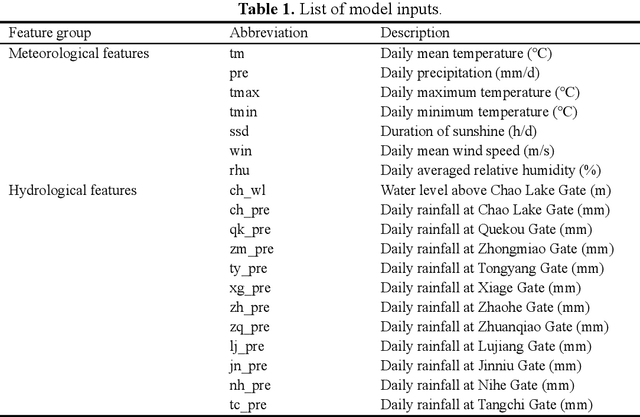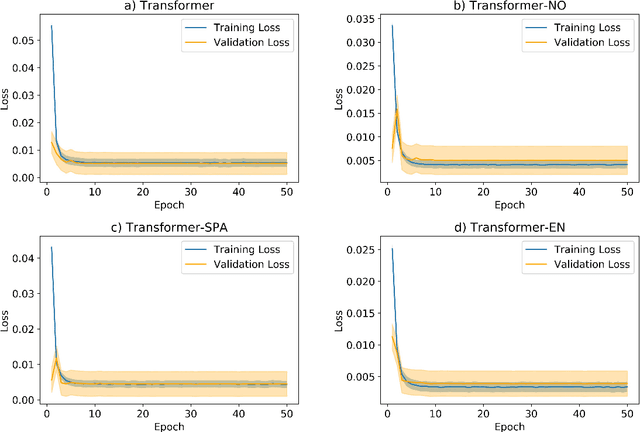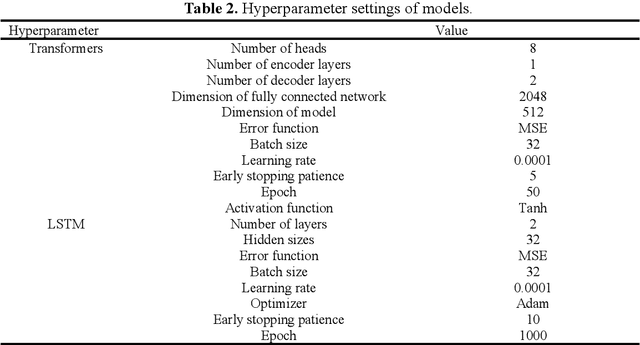Nana Bao
A Transformer variant for multi-step forecasting of water level and hydrometeorological sensitivity analysis based on explainable artificial intelligence technology
May 22, 2024



Abstract:Understanding the combined influences of meteorological and hydrological factors on water level and flood events is essential, particularly in today's changing climate environments. Transformer, as one kind of the cutting-edge deep learning methods, offers an effective approach to model intricate nonlinear processes, enables the extraction of key features and water level predictions. EXplainable Artificial Intelligence (XAI) methods play important roles in enhancing the understandings of how different factors impact water level. In this study, we propose a Transformer variant by integrating sparse attention mechanism and introducing nonlinear output layer for the decoder module. The variant model is utilized for multi-step forecasting of water level, by considering meteorological and hydrological factors simultaneously. It is shown that the variant model outperforms traditional Transformer across different lead times with respect to various evaluation metrics. The sensitivity analyses based on XAI technology demonstrate the significant influence of meteorological factors on water level evolution, in which temperature is shown to be the most dominant meteorological factor. Therefore, incorporating both meteorological and hydrological factors is necessary for reliable hydrological prediction and flood prevention. In the meantime, XAI technology provides insights into certain predictions, which is beneficial for understanding the prediction results and evaluating the reasonability.
Implementing a new fully stepwise decomposition-based sampling technique for the hybrid water level forecasting model in real-world application
Sep 19, 2023



Abstract:Various time variant non-stationary signals need to be pre-processed properly in hydrological time series forecasting in real world, for example, predictions of water level. Decomposition method is a good candidate and widely used in such a pre-processing problem. However, decomposition methods with an inappropriate sampling technique may introduce future data which is not available in practical applications, and result in incorrect decomposition-based forecasting models. In this work, a novel Fully Stepwise Decomposition-Based (FSDB) sampling technique is well designed for the decomposition-based forecasting model, strictly avoiding introducing future information. This sampling technique with decomposition methods, such as Variational Mode Decomposition (VMD) and Singular spectrum analysis (SSA), is applied to predict water level time series in three different stations of Guoyang and Chaohu basins in China. Results of VMD-based hybrid model using FSDB sampling technique show that Nash-Sutcliffe Efficiency (NSE) coefficient is increased by 6.4%, 28.8% and 7.0% in three stations respectively, compared with those obtained from the currently most advanced sampling technique. In the meantime, for series of SSA-based experiments, NSE is increased by 3.2%, 3.1% and 1.1% respectively. We conclude that the newly developed FSDB sampling technique can be used to enhance the performance of decomposition-based hybrid model in water level time series forecasting in real world.
 Add to Chrome
Add to Chrome Add to Firefox
Add to Firefox Add to Edge
Add to Edge